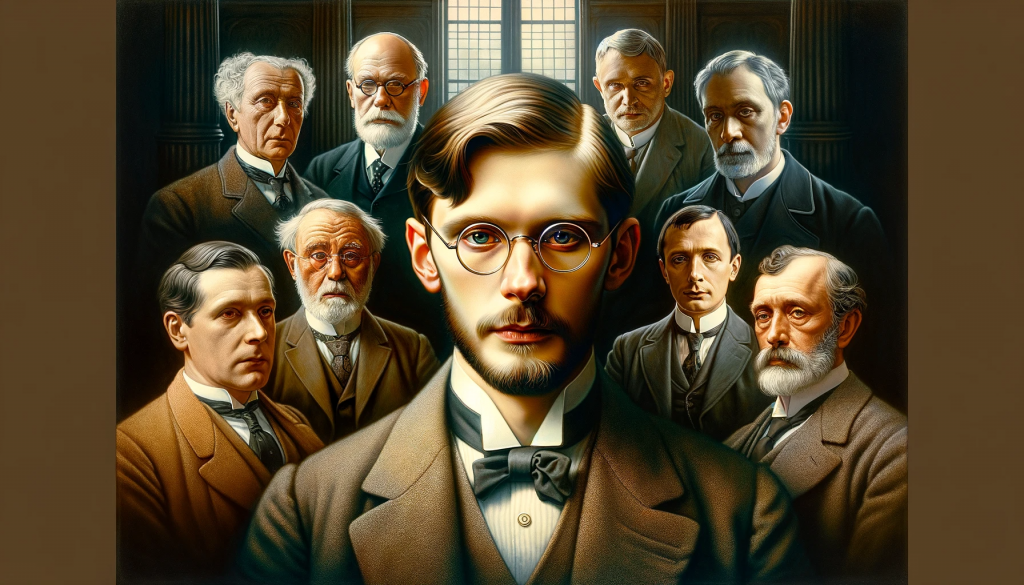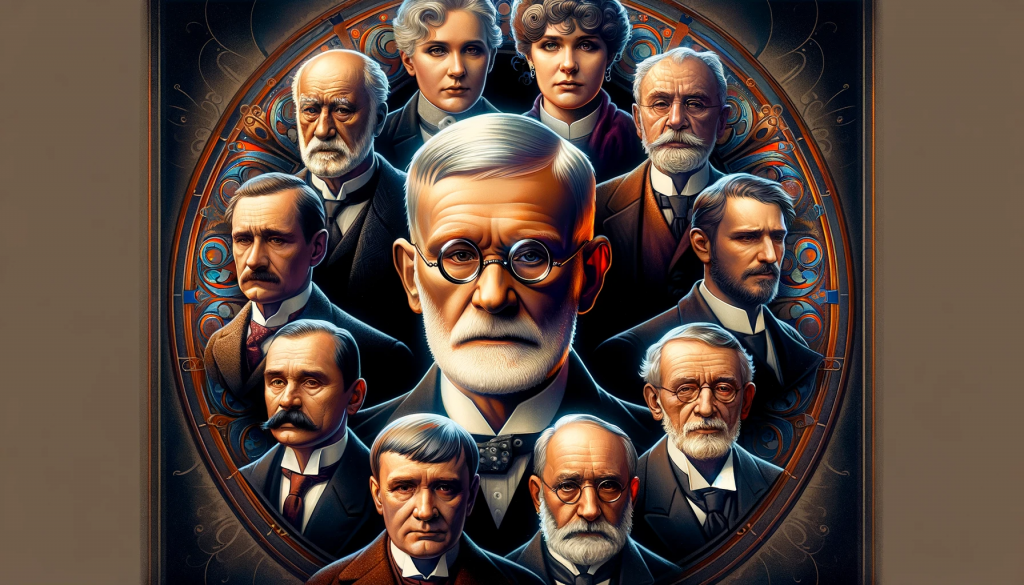The Gurus of Depth Psychology: A Quick Overview & Introduction to the Depth Psychology


In this post, we will unveil the Gurus or Pioneers of Depth Psychology, and how each served as a revered teacher of their time, imparting key wisdom in the evolution of the concept of Psyche. Embark on this pilgrimage with the Pioneers of Depth Psychology, as they illuminate the path to unraveling the complexities of the psyche, weaving a narrative of scientific insight and intellectual enlightenment. In the realm of Depth Psychology, the aim is to uncover the intricacies of one’s wholeness, studying the subtle interplay of unconscious processes that shape our conscious reality.
This table provides a concise overview of each individual and the corresponding period in which they made significant contributions to the field of depth psychology. I use the term “Guru,” not so much in the sense of an expert, but in the etymology of the word Guru in which “Gu” means darkness and “Ru,” means remover or light bringer to the darkness.
| Person | Guru | Time Period |
|---|---|---|
| Franz Mesmer | The Guru Of Rapport | 1734–1815 (18th century) |
| Jean-Martin Charcot | The Guru Of Autosuggestion | 1825–1893 (19th century) |
| Sigmund Freud | The Guru Of the Subconscious & the Pleasure Principle | 1856–1939 (Late 19th to early 20th century) |
| Alfred Adler | The Guru Of Teleology & Will to Power | 1870–1937 (Late 19th to early 20th century) |
| Anna Freud | The Guru Of Child Psychology | 1895–1982 (Early to mid-20th century) |
| Melanie Klein | The Guru Of Child Psychology | 1882–1960 (Early to mid-20th century) |
| John Bowlby | The Guru On Attachment | 1907–1990 (20th century) |
| Carl Jung | The Guru Of the Collective Unconscious | 1875–1961 (Late 19th to mid-20th century) |
Franz Mesmer (1734–1815): The Guru of Rapport
- Area: Austria, Germany, France
- Time: 18th century
- Main Field of Expertise: Animal Magnetism, Mesmerism
From shamanism to exorcism, the quest of Depth Psychology has always been to unveil what lies between the visible and the invisible. Franz Mesmer’s theory of “Animal Magnetism” marked a crucial step, laying the groundwork for establishing a connection and rapport with patients, a vital element in the gradual systemization of modern psychotherapeutic concepts.
Jean-Martin Charcot (1825–1893): The Guru of Autosuggestion
- Area: France
- Time: 19th century
- Main Field of Expertise: Neurology, Hysteria
From Mesmer, we move on to Jean-Martin Charcot, whose contributions especially inspired Sigmund Freud and Pierre Janet. Charcot’s study of the responses to autosuggestions in hypnotism contributed to Janet’s “fixed ideas” which would later evolve into Jung’s elaborated theory of complexes. Charcot’s study of Hysteria opened the door for Freud to develop his psychosexual theories.
Sigmund Freud (1856–1939): The Guru of the Subconscious & the Pleasure Principle
- Area: Austria, United Kingdom
- Time: Late 19th to early 20th century
- Main Field of Expertise: Psychoanalysis, Psychiatry
Enter the domain of Freud, a luminary whose model of the psyche introduced accessible terms like “id, ego, and superego.” These terms provided fertile ground for Jung to unveil the intricate layers of the psyche—persona, shadow, and “The Self” among them. Freud’s ideas primarily focused on the libidinal processes in the Psyche, where the neurotic lives of individuals (according to Freud) were nothing more than the result of sexual maturity alongside or in conflict with moral conscience.
Alfred Adler (1870–1937): The Guru of the Teleology & the Will to Power
Often going unnoticed in the scientific cosmos, Alfred Adler emerges, underscoring that the psyche is not merely a historical artifact but a living entity with teleological aspirations that strives towards future goals. Freud’s “pleasure principle” and Adler’s “will to power” became analogs for explaining Jung’s theories of extraversion and introversion respectively.
Anna Freud (1895–1982) and Melanie Klein (1882–1960): The Gurus of Child Psychology
- Area: Austria (Anna Freud), United Kingdom (Melanie Klein)
- Time: Early to mid-20th century
- Main Field of Expertise: Psychoanalysis, Child Psychology
The path then leads us to Freud’s Daughter, Anna, and the adept disciple Melanie Klein, scholars in the creation of “Object Relations Theory” that would be applied to psychoanalysis in children. Anna, an expert in revealing ego defenses, and Melanie, a discerning explorer introduced the concept of the “good breast/bad breast” duality. Klein significantly influenced subsequent theorists D.W. Winnicott and Heinz Kohut, who both focused on the intrapsychic experience of objects. Winnicott’s with his concept of the “transitional object” and Kohut’s with the “self-object.”
John Bowlby (1907–1990): The The Guru on Attachment
- Area: United Kingdom
- Time: 20th century
- Main Field of Expertise: Attachment Theory, Developmental Psychology
John Bowlby’s attachment theory classified children as “secure” or “insecure” attached, scientifically grounding the manifestations of the psyche in a predictable manner and marking an essential contribution to Depth Psychology.
Carl Jung (1875–1961): The Guru of the Collective Unconscious
- Area: Switzerland
- Time: Late 19th to mid-20th century
- Main Field of Expertise: Analytical Psychology, Depth Psychology
Finally, though out of order, Carl Gustav Jung takes the spotlight with his profound theory of the “Collective Unconscious,” in which he took a scientific approach to the exploration of dreams, typology, and individuation within the context of religion and mythology. His teachings resonate as a guiding beacon, leading seekers toward a scientific understanding of meaning and self-discovery. He attempted to bring meaning back to the lives of those who felt they had lost their way. Jung’s big entry into the field came when he was able to provide evidence for Freud’s theories (mainly the Theory of Repression), with the Word Association Test. Though Jung is often associated with Freud, and drew influence from most of the aforementioned above, he cited Eugen Bluer as having a larger impact on him and his work.
Concluding Remarks:
In exploring the roots of Depth Psychology, it becomes apparent that the “enlightenment” period, although laying the seeds for this field, seems to have merely repackaged existing concepts from different corners of the world. The conceptual split of the psyche from the body during this period was deemed “enlightened,” projecting consciousness outwardly in a way that required an external element for awareness. The term “enlightenment” itself appears ironic, given the connotations of finding God, peace, or meaning associated with true enlightenment. In contrast, this period led to a liberation from religion and God through rationalism, resulting in less peace, an increase in mental illness, and a quest for solutions to problems like Hysteria, Somnambulism, etc. Still today, it is Tres Chique to be scientific and skeptical.
However, the struggle lies in accepting the lofty title of this era. Were these thinkers genuinely enlightened? While they broke free from traditional notions of God and religion, the question arises whether this liberation extended to all aspects of their understanding. Perhaps the lapse in rational judgment, marked by the perceived freedom of rationalists, was a necessary precursor for developing a psychological approach to wholeness—what we now recognize as depth psychology. It signaled a new angle to explore the multifaceted aspects of human consciousness. Considering Meister Eckhart’s profound statement, “God rid me of God,” we can interpret it as a recognition that an overemphasis on the idea of God can obstruct the direct experience of God, meaning, or wholeness. In this light, the skeptical reasoning of the Enlightenment period gains value. The rigid dogma had hindered growth, necessitating a shift in perspective.
Yet, the term “enlightenment” remains challenging. It appears to champion the ego rather than the Self, suggesting a one-sided and inflated viewpoint, something that mainly Carl Jung attempted to tackle. As we navigate the historical landscape, it becomes evident that this period, with its contradictions and complexities, played a crucial role in setting the stage for the emergence of Depth Psychology and Yoga’s journey to the West. We will explore this in more detail in. the coming articles.
Resources:
Ellenberger, H. (1970). The Discovery of the Unconscious: The History and Evolution of Dynamic Psychiatry. New York: Basic Books.
Responses